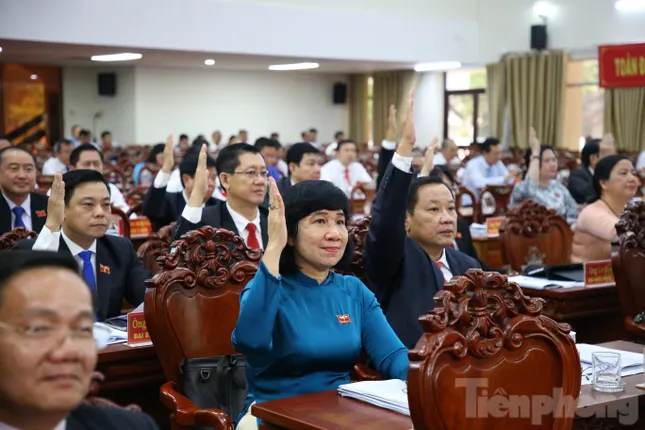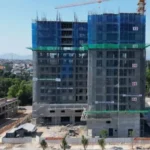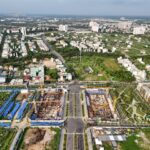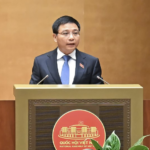On June 27th, at the 21st session of the Can Tho City People’s Council, term X (2021-2026), six resolutions were passed, including the city’s housing development program until 2030. This was also the last session of the City People’s Council before the merger with Hau Giang and Soc Trang provinces.
VND 220,000 billion for housing development
According to statistics from the Can Tho People’s Committee, in the past period, the average housing area in the city only reached more than 24m2/person (the target is 25.5m2/person). The total housing area of the city is just over 30.6 million m2 (the target for this year is 33 million m2). The development of social housing and official residences is slow, and the proportion of insecure and rudimentary houses remains high.
The reason, according to the Can Tho authorities, is due to both objective and subjective factors. This includes significant changes in institutions, laws, and planning in the 2021-2025 period.
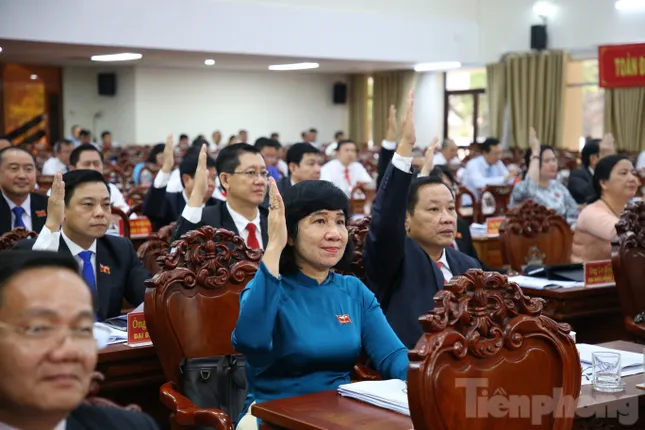
Delegates of the Provincial People’s Council vote to pass the draft resolutions at the session.
Can Tho sets a target that by 2030, it will complete nearly 20 million square meters of housing, increasing the average area to 30 m2/person; eliminating all temporary, rudimentary, and insecure houses; and ensuring that 90% of houses are connected to synchronous electricity, water, and sewage systems.
In the next five years, Can Tho plans to build more than 110,000 commercial houses and a minimum of 9,100 social houses and worker dormitories.
Additionally, they aim to complete more than 1,000 houses for the armed forces and 310 official residences to serve the rotation and transfer of officials.
The total capital needed for this program is about VND 220,000 billion, mainly from businesses and people, and partly from the state budget.
Preparing to welcome officials from Soc Trang and Hau Giang
At the session, Mr. Le Tien Dung, Director of the Department of Construction of Can Tho, said that according to a survey, after the provincial merger, about 140 officials at the department level and above from Hau Giang and Soc Trang are expected to work in Can Tho and will need to be arranged official residences.
To meet the demand for official residences, the Department of Construction has proposed to the Can Tho People’s Committee to use the Tay Nam Bo Guesthouse (62 rooms), Guesthouse No. 2 (36 rooms), and the guesthouse behind the City Party Committee (20 rooms). The total number of official residence rooms is about 118.
For the remaining shortage, the Department of Construction is reviewing and converting the function of 20 old houses to supplement.
In the long run, Can Tho aims to build an additional 310 official residences with a cost of more than VND 365 billion. “The land has been prepared, and if approved by the People’s Council, the project can be implemented in the 2026 phase,” said Mr. Dung.
In addition to official residences, Can Tho has about 500 social housing units in apartment buildings such as Gia Phuc (Tra Noc), Hong Loan 5C, Nam Long 2, and An Phu Ecocity, waiting for officials and civil servants to register for rent or purchase. The Department of Construction will coordinate with departments and branches to provide specific information so that officials with needs can access them.
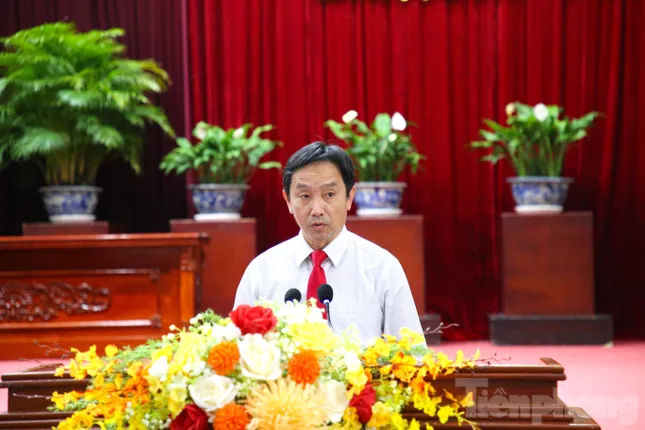
Mr. Le Tien Dung, Director of the Department of Construction, speaks. Photo: Nhat Huy.
Regarding financial support for officials relocating after the merger, the Department of Finance is proposing to support each official from Soc Trang and Hau Giang provinces working in Can Tho with about VND 4 million/person/month, including travel and accommodation expenses.
In terms of transportation, there are currently five bus routes connecting Can Tho City with Hau Giang and Soc Trang provinces. The Department of Construction is coordinating with Phuong Trang Company to survey and open 10 new routes with a frequency of 15 minutes/trip and a mechanism to subsidize free bus fares for officials, public employees, and employees after July 1, 2025.
Accelerating the handover of assets and dossiers
Speaking at the closing of the session, Mr. Nguyen Xuan Hai, Vice Chairman of the Can Tho City People’s Council, said: From July 1st, the new Can Tho City will officially operate, with 103 new communal-level administrative units from the rearrangement of the three localities (Can Tho, Hau Giang, and Soc Trang). The new People’s Council will comprise all the current delegates of the People’s Councils of the three localities.
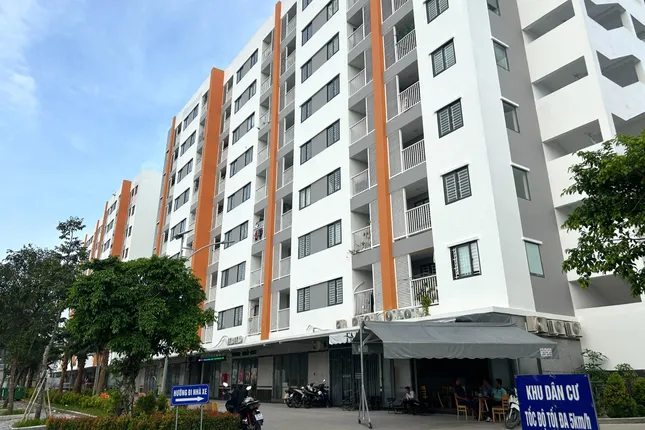
Hong Loan 5C Social Housing Project, Can Tho City.
Mr. Nguyen Xuan Hai requested that the City People’s Committee urgently complete the reorganization of the apparatus, handover of assets, finances, headquarters, dossiers, and related legal issues so that the new units can operate smoothly and effectively.
“We must ensure uninterrupted operation, especially in key areas such as public investment, land, planning, and social order, to best serve the people’s lives,” said Mr. Hai.
According to Mr. Hai, the session also passed the Can Tho City Housing Development Program until 2030. This is a basis for the city to attract investment and develop residential areas and social housing to meet the increasing housing needs of the people after the merger.
At this session, the Standing Committee of the Can Tho City People’s Council passed and reported to the City People’s Council on the dismissal of Mr. Pham Van Hieu, former Chairman of the City People’s Council, from his duty as a People’s Council member, following his personal wish (retired from May 1, 2025).
The Can Tho City People’s Council also passed a resolution to dismiss Mr. Nguyen Van Thuan, former Director of Can Tho City Police, Head of the Can Tho City Delegation of the National Assembly, retired from June 1, 2025, and Mr. Ho Van Gia, former Director of the Department of Foreign Affairs, retired from May 1, 2025, from their positions as members of the Can Tho City People’s Committee for the 2021-2026 term.
The Western Capital: A Real Estate Investment Haven
In the first half of 2025, Can Tho’s real estate market experienced a significant surge, attributed to a series of strategic investments in public infrastructure and synchronized regional planning. As the economic and urban hub of the Southwest region, the city is embarking on a promising new cycle of development and growth.
The Flow of Capital: Unlocking the Real Estate Market
With interest rates at an all-time low and a generous credit environment, the growth of credit has been phenomenal. The real estate sector has been a key beneficiary of this credit boom, experiencing a surge in investment without it becoming a “bubble”.
Unleashing Thai Nguyen’s Social Housing Revolution: Accelerating Project Deployment
The Thai Nguyen People’s Committee has emphasized the importance of meeting the target of constructing 1,084 social housing units by the end of 2025. According to the Ministry of Construction, Thai Nguyen is among the provinces facing challenges in achieving social housing development goals and needs to step up its efforts.
Unlocking Real Estate Credit Growth: Navigating the Cycle
In the face of ongoing external uncertainties, the Government maintains an ambitious GDP growth target of over 8%. To achieve this goal, in addition to promoting public investment, unlocking capital for the real estate sector is crucial. The current low-interest-rate environment and ample credit room are conducive to attracting funds back into the real estate market.

























